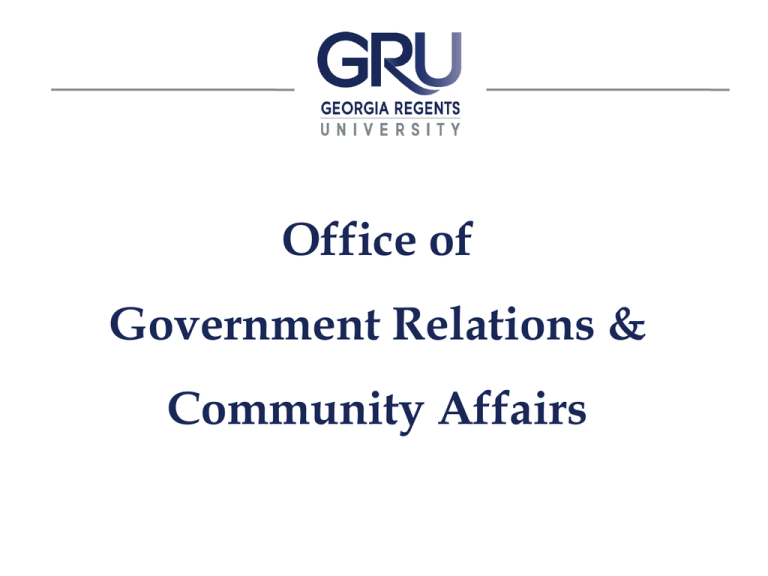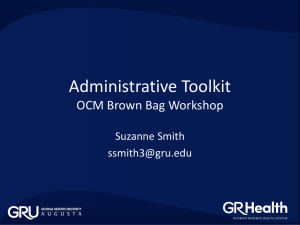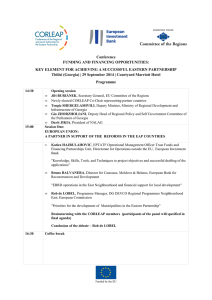Office of Government Relations & Community Affairs
advertisement

Office of Government Relations & Community Affairs Mission The Office of Government Relations and Community Relations serves as a liaison between Georgia Regents University (GRU) and Georgia Health Sciences Health System, the community, and local, state and federal officials. We advocate and leverage productive relationships to build partnerships, support of public policy makers and the community in order to further the full mission of Georgia Regents University, an integrated academic health center. Meet Our Team Michael Shaffer Vice President of Government Relations & Community Affairs, CAO Monty Philpot Director of Federal Relations Meg Fischer Director of State Relations Cedric Johnson Director of Community Affairs Our Goals • For Georgia Regents University to become a top-50 research institution and world-class academic health center • For Georgia Regents University to achieve a National Cancer Institute (NCI) designation for a consolidated cancer research center • Plan, develop and direct all aspects of the university’s state and federal operations to secure funding and favorable legislative provisions and rules to the benefit the Enterprise • Plan and direct public policy development, including reviews and evaluations to identify key government issues for the University and the Health System University System of Georgia other R1 Universities How We Plan To Achieve the Goals • Coordinate the University’s government relations activities at the Federal and State level • Involve federal, state and local elected officials and key stakeholders. • Enhance and develop broader community partnership initiatives across the state of Georgia to support the GRU Enterprise • Participate in local and state organizations to help understand the broader missions of the GRU Enterprise • Requires more community involvement! Georgia Regents University (GRU) 2013 Legislative Priorities • Cancer funding: • • • The GRU proposed budget for the comprehensive cancer center includes $45 million in bond money and $10 million for continued research dollars for the new cancer research facility With a $55 million state investment, GRU would construct additional cancer research laboratories, expanding its research campus and enhancing its hiring opportunities, while reinforcing its reputation and ability to leverage increased funding from NIH, peer-reviewed funding and private philanthropy This investment will help to sustain forward momentum in building a world-class program for the state of Georgia in cancer prevention, diagnosis, and treatment Georgia Regents University (GRU) 2013 Legislative Priorities • Education Commons funding: • • • • 110,000 square feet 4.5 acres directly adjacent to the new College of Dental Medicine Will serve as the primary educational facility for dental and medical students Proposed $5 million for equipment funding in the USG FY14 budget and GRU will advocate for the retention of this financial support Georgia Regents University (GRU) 2013 Legislative Priorities • Expansion of GRU campus into Northwest Georgia (Rome): • • • • An integral component of the ‘hub and spoke’ model of medical education delivery Northwest Georgia Clinical Campus requires start-up and operational funding MCG estimates an annual budget requirement of $1 million for salaries of the Campus dean, clerkship coordinators, travel, office space, and other associated costs of delivering medical education The money for the campus is carved out of the existing expansion funding and we would like to change this to a line item in this year’s and future budgets to ensure the state’s ongoing support Georgia Regents University (GRU) 2013 Legislative Priorities • Retain exemption of provider payment fee (bed tax): • • Facing Medicaid deficits, Governor Sonny Perdue implemented a hospital provider payment program (“bed tax”) of 1.45% of Net Patient Revenue in 2010, which is set to expire in June of 2013 Because it is a state-owned hospital, Georgia Regents University Health System was excluded in the original legislation. GRU will advocate for this exemption in any future proposals • Certificate of Need (CON): • • Georgia Regents University believes the CON process helps contain costs by reducing the likelihood of overutilization and unnecessary duplication of services We support an open and transparent CON process and encourage legislators and DCH to maintain its basic provisions Georgia Regents University (GRU) 2013 Legislative Priorities • Stem cell Research: • • • The human body has tremendous innate capacity to repair and regenerate injured tissues through the use of bone marrow derived stem cells Georgia Regents University is utilizing this technology and is currently undertaking multiple research studies involving adult stem cells primarily through its Institute for Regenerative & Reparative Medicine (IRRM) GRU will oppose efforts to limit adult stem cell research Georgia Regents University (GRU) 2013 Legislative Priorities • Carry Forward legislation: • GRU supports USG’s efforts to reauthorize provisions relating to write off of small amounts due to the state and allowing USG to carry forward: • • • • • Unexpended student technology fees Continuing education fee revenue Indirect cost recovery Departmental sales and services And up to 3% of tuition revenue • USG Funding formula: • • GRU is advocating for a “hold harmless” provision related to graduation rates for consolidating institutions We also urge legislators and USG to consider a medical school’s differing characteristics from traditional colleges and universities Georgia Regents University 2013 Community Affairs Priorities • Form and maintain relationships with local city officials, health and community agencies, and government representatives • Encourage open dialogue between the university and elected officials and members of the Augusta community concerning GRU priorities, activities and decisions • Assist external audiences in better serving their constituents through the dissemination of information and services • Hold regular meetings with elected officials and members of the university’s neighboring communities • Represent the university at community events • Solicit support for the university through community engagement Georgia Regents University 2013 Community Affairs Priorities • • • • • • Pursue opportunities to fund the creation of community engagement programs Strengthen community engagement programs that align with university and community priorities Support university and state college readiness goals through targeted community engagement initiatives for high school students Garner community support for the university’s strategic goals and priorities Promote the university’s academic programs and offerings through increased collaboration with external agencies Support the university’s enrollment goals by strengthening relationships with area high schools Questions










